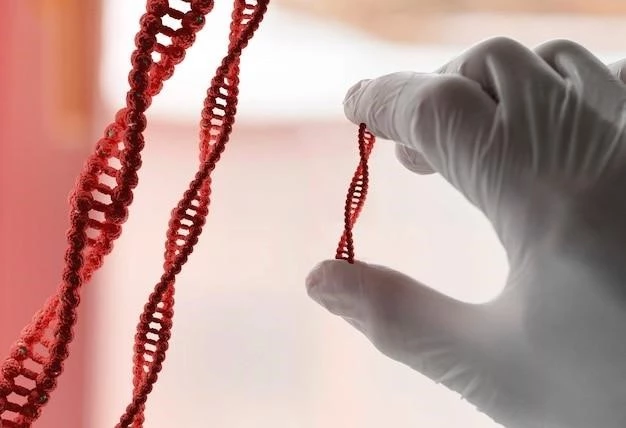Disease ‒ Hereditary Carnitine Deficiency Myopathy
Introduction to Hereditary Carnitine Deficiency Myopathy
Hereditary Carnitine Deficiency Myopathy is a rare genetic disorder characterized by muscle weakness, pain, cramps, and breakdown․ This condition is caused by an inherited deficiency in the carnitine transporter system, leading to impaired transport of fatty acids into the mitochondria for energy production․
Individuals with this disorder may experience metabolic disturbances due to the abnormal processing of amino acids and fatty acids․ The primary role of carnitine in the body is to transport fatty acids into the mitochondria, where they are utilized as a source of energy․ In the absence of sufficient carnitine, there is a decreased ability to generate energy, particularly in muscle tissues․
The myopathy associated with carnitine deficiency results from the dysfunctional metabolism of fatty acids, leading to muscle weakness and fatigue․ This condition can manifest in various degrees of severity, with some individuals experiencing mild symptoms while others may have more profound muscle impairments․
Understanding the mechanisms underlying Hereditary Carnitine Deficiency Myopathy is crucial for proper diagnosis and management of affected individuals․ Research into potential treatment strategies and advancements in the field offer hope for improved outcomes for individuals living with this rare genetic disorder․
Understanding Carnitine and Amino Acids
Carnitine is a crucial compound required for the transportation of fatty acids into the mitochondria, where they undergo beta-oxidation to produce energy․ Amino acids are essential building blocks of proteins, playing a vital role in bodily functions and muscle maintenance․
In individuals with Hereditary Carnitine Deficiency Myopathy, the impaired function of the carnitine transporter system disrupts the normal process of fatty acid metabolism․ This disruption leads to a deficiency in energy production, affecting muscle function and causing weakness․
Amino acids are vital for protein synthesis and metabolic pathways within the body․ In the context of carnitine deficiency myopathy, abnormalities in amino acid metabolism can contribute to muscle breakdown and weakness․ The intricate interplay between carnitine and amino acids highlights the complex nature of metabolic disorders․
Understanding the relationship between carnitine and amino acids is essential for comprehending the underlying mechanisms of Hereditary Carnitine Deficiency Myopathy․ Research into these metabolic pathways provides valuable insights into potential treatment strategies and management approaches for individuals affected by this genetic disorder․
The Role of Mitochondria in Carnitine Deficiency Myopathy
Mitochondria play a critical role in cellular energy production through ATP generation․ In the context of Hereditary Carnitine Deficiency Myopathy, dysfunctional transport of fatty acids into the mitochondria impairs the energy-generating process․
Since carnitine is essential for shuttling fatty acids across the mitochondrial membrane for beta-oxidation, its deficiency disrupts the energy balance within muscle cells․ This disruption leads to muscle weakness, fatigue, and metabolic abnormalities․
The mitochondria’s inability to efficiently utilize fatty acids due to carnitine deficiency results in a decreased capacity to meet the energy demands of muscle tissues․ This energy deficit contributes to the myopathy observed in individuals affected by this rare genetic disorder․
Understanding how carnitine deficiency impacts mitochondrial function is crucial for elucidating the pathophysiology of Carnitine Deficiency Myopathy․ Research focusing on the intricate relationship between carnitine, fatty acid metabolism, and mitochondrial function offers insights into potential therapeutic interventions for this condition․
Symptoms of Hereditary Carnitine Deficiency Myopathy
Individuals with Hereditary Carnitine Deficiency Myopathy may experience a range of symptoms related to muscle weakness, pain, and metabolic dysfunction․ Muscle weakness and fatigue are common manifestations of this disorder, often accompanied by muscle cramps and discomfort․
Patients may also present with metabolic disturbances due to the abnormal processing of amino acids and fatty acids․ This can lead to a variety of symptoms such as exercise intolerance, muscle breakdown, and impaired muscle performance․

Some individuals with Carnitine Deficiency Myopathy may experience recurrent episodes of muscle pain and weakness, particularly during physical activity․ These symptoms can impact daily functioning and quality of life, highlighting the need for proper diagnosis and management․
It is essential for healthcare providers to recognize the diverse array of symptoms associated with Hereditary Carnitine Deficiency Myopathy to facilitate timely diagnosis and appropriate treatment interventions․ Understanding the spectrum of symptoms is crucial for improving outcomes and enhancing the quality of life for individuals living with this rare genetic disorder․
Causes of Carnitine Deficiency Myopathy
Carnitine Deficiency Myopathy is primarily caused by an inherited deficiency in the carnitine transporter system, which impairs the transport of fatty acids into the mitochondria for energy production․ This genetic disorder disrupts the normal metabolic process involving carnitine, fatty acids, and mitochondria․
The deficiency in the carnitine transporter system can be attributed to genetic mutations that affect the expression or function of proteins involved in carnitine transport․ These mutations disrupt the normal flow of fatty acids into the mitochondria, leading to a deficiency in energy production and subsequent muscle weakness․
In some cases, Carnitine Deficiency Myopathy may also arise from metabolic abnormalities that impact the synthesis or utilization of carnitine within the body․ Factors such as diet, certain medications, or medical conditions can influence carnitine levels and contribute to the development of myopathic symptoms․
Understanding the genetic and metabolic factors underlying Carnitine Deficiency Myopathy is crucial for diagnosing and managing this rare disorder effectively․ Identifying the specific causes of carnitine deficiency in individual patients can guide personalized treatment strategies and optimize outcomes for individuals affected by this condition․
Diagnosis and Testing for Carnitine Deficiency Myopathy
Diagnosing Carnitine Deficiency Myopathy involves a comprehensive evaluation of clinical symptoms, family history, and laboratory tests․ Initial assessment may include a physical examination to assess muscle weakness, pain, and other myopathic symptoms․
Laboratory tests play a crucial role in confirming the diagnosis of Carnitine Deficiency Myopathy․ Blood tests can measure carnitine levels, amino acids, and markers of muscle breakdown․ Additionally, genetic testing may be conducted to identify specific mutations associated with the disorder․
Electromyography (EMG) and muscle biopsies may be performed to evaluate muscle function and structure in individuals suspected of having Carnitine Deficiency Myopathy․ These tests can provide valuable insights into the extent of muscle involvement and help differentiate this condition from other neuromuscular disorders․
Diagnostic imaging studies, such as magnetic resonance imaging (MRI) or ultrasound, may also be utilized to assess muscle morphology and detect any abnormalities․ Combining the results of clinical evaluations, laboratory tests, and imaging studies is essential for reaching an accurate diagnosis of Carnitine Deficiency Myopathy․
Treatment Options for Hereditary Carnitine Deficiency Myopathy
The management of Hereditary Carnitine Deficiency Myopathy aims to address symptoms, improve muscle function, and optimize nutritional support․ Treatment strategies for this genetic disorder may involve a multidisciplinary approach that includes medical interventions and lifestyle modifications․
Supplementation with carnitine, either orally or intravenously, can help compensate for the deficient carnitine levels in individuals with Carnitine Deficiency Myopathy․ This supplementation aims to enhance fatty acid transport into the mitochondria, supporting energy production in muscle tissues․
Physical therapy and exercise programs tailored to the individual’s specific needs can help manage muscle weakness, improve strength, and enhance mobility․ These interventions play a crucial role in maintaining muscle function and overall quality of life for individuals with Carnitine Deficiency Myopathy․
In severe cases, individuals with Hereditary Carnitine Deficiency Myopathy may require pharmacological treatments to alleviate symptoms such as muscle pain and cramps․ Close monitoring of muscle function, metabolic parameters, and overall health status is essential for optimizing treatment efficacy and patient outcomes․
Collaboration between healthcare providers, genetic counselors, and specialists in neuromuscular disorders is key to developing a comprehensive treatment plan for individuals with Carnitine Deficiency Myopathy․ Tailoring interventions to each patient’s unique presentation and needs can help improve symptom management and enhance functional outcomes․
Management of Carnitine Deficiency Myopathy
Effective management of Carnitine Deficiency Myopathy requires a holistic approach that addresses symptom control, functional preservation, and quality of life enhancement․ Regular monitoring and individualized care plans are essential components of the management strategy for this genetic disorder․
Nutritional counseling plays a crucial role in managing Carnitine Deficiency Myopathy․ A balanced diet rich in essential nutrients, including proteins, carbohydrates, and fats, is important for supporting muscle function and overall metabolic health․ Dietary adjustments may be recommended to optimize energy production and muscle performance․
Monitoring carnitine levels through regular blood tests is integral to assessing treatment efficacy and ensuring appropriate supplementation․ Tailoring carnitine supplementation to meet the individual’s needs and response to therapy is essential for maintaining optimal muscle function and metabolic balance․
Physical and occupational therapy can aid in preserving muscle strength, improving mobility, and enhancing independence in individuals with Carnitine Deficiency Myopathy․ These therapies focus on functional capacity, activities of daily living, and strategies for coping with the challenges posed by muscle weakness․
Psychosocial support and counseling are also important aspects of the management of Carnitine Deficiency Myopathy․ Providing emotional support, education, and resources to patients and their families can help navigate the complexities of living with a rare genetic disorder and promote overall well-being․
Research and Future Perspectives on Carnitine Deficiency Myopathy
Ongoing research on Carnitine Deficiency Myopathy focuses on elucidating the molecular mechanisms underlying the disorder, identifying potential therapeutic targets, and exploring novel treatment modalities․ Understanding the genetic determinants and metabolic pathways involved in this condition is crucial for advancing patient care and outcomes․
Emerging technologies, such as gene editing and personalized medicine approaches, hold promise for developing targeted therapies for individuals with Hereditary Carnitine Deficiency Myopathy․ These innovative strategies aim to address the root cause of the disorder and provide more effective treatment options․
Clinical trials evaluating the safety and efficacy of new interventions for Carnitine Deficiency Myopathy are underway, offering hope for improved symptom management and quality of life for affected individuals․ Collaborations between researchers, healthcare professionals, and patient advocacy groups are essential for advancing scientific knowledge and translating research findings into clinical practice․
Future perspectives on Carnitine Deficiency Myopathy also include the exploration of potential biomarkers for disease progression, innovative diagnostic tools, and precision medicine approaches․ By leveraging cutting-edge technologies and interdisciplinary collaborations, the field aims to enhance early detection, personalized treatment strategies, and overall outcomes for individuals living with this rare genetic disorder․
Conclusion
In conclusion, Hereditary Carnitine Deficiency Myopathy is a rare genetic disorder characterized by muscle weakness, metabolic disturbances, and impaired muscle function․ The dysfunction in carnitine transport and fatty acid metabolism results in a spectrum of symptoms, including muscle pain, cramps, and exercise intolerance․
Diagnosis of Carnitine Deficiency Myopathy involves a comprehensive evaluation encompassing clinical assessments, laboratory tests, and imaging studies to confirm the underlying genetic and metabolic abnormalities․ Treatment strategies focus on addressing symptoms, optimizing energy production, and improving muscle performance through a multidisciplinary approach․
Ongoing research and advancements in the field offer promising avenues for the development of targeted therapies, personalized treatment options, and enhanced diagnostic tools for individuals affected by Carnitine Deficiency Myopathy․ By fostering collaborative efforts and continuous innovation, the medical community endeavors to improve the quality of care and outcomes for patients living with this rare genetic disorder․
Overall, a holistic approach to the management of Carnitine Deficiency Myopathy, incorporating nutritional support, physical therapy, and psychosocial care, is essential for maximizing patient well-being and quality of life․ Continued research, education, and advocacy are crucial for raising awareness, advancing scientific knowledge, and supporting individuals and families affected by this challenging condition․
